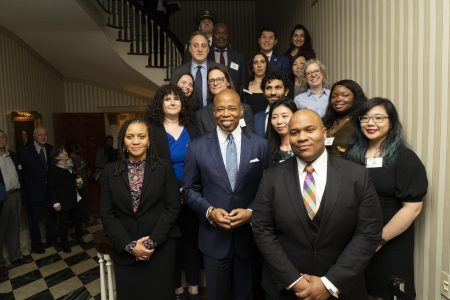New York City’s First Deputy Mayor Sheena Wright, alongside Mayor’s Office of Management and Budget Director Jacques Jiha and José Bayona, Executive Director of Mayor’s Office of Ethnic and Community Media, hosted a briefing on the Executive Budget for fiscal year 2025 on Tuesday, April 30, 2024.
Director Jiha led the briefing, emphasizing the challenge of closing the budget gap without federal intervention. The three major factors facing the City were balancing the budget, filling the stimulus-funded programs, and addressing the needs of asylum seekers. Given the projected economy from the prior year, this year’s budget seemed particularly difficult, requiring finding funds to support long-term programs previously funded by short-term CoViD-19 stimulus funds, along with addressing the increase in immigrants relying on city services.
Mayor Adams directed city agencies to review spending, implement hiring freezes, and identify actions to reduce City-funded spending by 5 percent through a Program to Eliminate the Gap (PEG), starting as early as November 2023 instead of the normal January 2024 cycle. Despite these challenges, the budget was balanced at $111.6 billion, accomplished without tax increases, layoffs, or major service disruptions.
The city has even been able to manage $8.2 billion in reserve as a cushion for any unforeseen problems. Director Jiha made sure to mention that we are not out of the woods yet. With the economy and job market looking towards evening out next year, may cause concern among other economic problems but they are preparing and planning and are sure they will overcome any issues as they always do.
Through these efforts, Mayor Adams allocated $80 million from PEG savings towards initiatives such as supporting cultural institutions and funding two graduating NYPD classes, adding 2,400 officers to the force this year.
The City now awaits review and allocation decisions from the city council regarding the budget.
During the briefing, city officials took questions from reporters, many of which focused on the migrant crisis, with promises of further details on budget breakdowns. Although reporters pressed for specifics, the city did not provide a breakdown of spending related to migrant support, which currently totals approximately 65,000 individuals with a budget of $4 billion.
Questions also arose regarding library closures, with Director Jiha explaining that libraries determine their own budgets, though the city aims to maintain library services at full capacity.
One surprising revelation came regarding congestion pricing, with Director Jiha stating that the city does not directly receive any revenue from congestion pricing, as it falls outside the city’s purview.
Unfortunately, Deputy Mayor Sheena Wright was unavailable for comment due to scheduling conflicts related to a city emergency. However, previous interviews have outlined the city’s plans, including increased police presence, employment initiatives, expansion of early childhood education, enhanced mental health support in schools, bilingual programs, climate initiatives, and arts and literacy programs among others.
For further details, the Fiscal Year (FY) 2025 Executive Budget can be accessed here.









